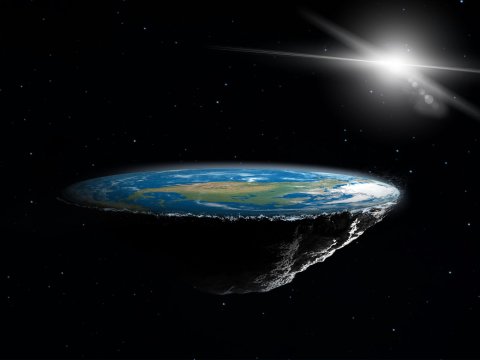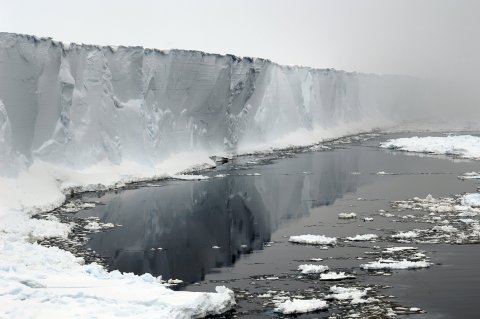Every day in the media we see once-unthinkable science headlines. More than seven hundred cases of measles across 22 states in the U.S., largely due to vaccine deniers. Climate change legislation stalled in the U.S. Senate—due mainly to partisan politicians who routinely confuse climate and weather—even as scientists tell us that we have only until 2030 to cut worldwide carbon emissions by half, then drop them to zero by 2050. And, in one of the most incredible developments of my lifetime, the Flat Earth movement is on the rise.
To make matters worse, scientists (and others who care about it) have not really found an effective way of fighting back against science denial. In this "post-truth" era—with headlines like "Why Facts Don't Change Our Minds"—it is an open question how to convince people who reject evidence, not just in science, but also on a host of other factual matters. In the empirical realm, scientists often choose to respond by presenting their evidence, then get upset and refuse to engage more when their data aren't accepted or their integrity is questioned. Perhaps this is understandable, but I also believe it is dangerous just to walk away and dismiss science deniers as irrational (even if they are.) Even worse is to react to their hectoring on the question of whether there is "100 percent consensus" on global warming, or whether we're "certain" that vaccines don't cause autism, by blustering about "proof," which only gives aid and comfort to one of the most damaging myths about science.
But we really can't afford to do this anymore, nor can we afford to defend science simply by talking about its successes. Climate change "skeptics" already know about the marvels of chemotherapy...but what does that have to do with the spike in global temperatures in 1998? And philosophers of science have spent the last hundred years looking in vain for some definitive logical "criterion of demarcation" between science and non-science.
A better way to respond is to stop talking about proof, certainty, and logic, and start talking more about scientific "values." In my book The Scientific Attitude: Defending Science From Denial, Fraud, And Pseudosience, I defend the idea that what is most distinctive about science is not its method but its "attitude": the idea that scientists care about evidence and are willing to change their views based on new evidence. This is what truly separates scientists from their deniers and imitators.
I had a chance to test this theory in person recently when I attended the Flat Earth International Conference (FEIC) in Denver, Colorado, in November 2018. There I found myself among six hundred cheering, clapping Flat Earth advocates in the main ballroom of the Crowne Royal Hotel and Convention Center, who were taking part in a two-day extravaganza of presentations, multimedia performances, and "evidence" that the "globalists" have been pulling the wool over our eyes for millennia.

First, let's deal with the threshold question: yes, these people were serious. Believing the Earth is flat is not something one would come to lightly, for they are routinely persecuted for their views. Everyone I spoke to said that they used to believe in the global Earth but one day "woke up" and realized that there was a worldwide conspiracy of people who had been lying to them. "Trust your eyes," was their mantra. "Do your own experiments." "Water is level." "Space is fake." "A government that could lie to you about 9/11 and the Moon landing is one that could lie to you about Flat Earth."
Most Flat Earthers describe their conversion as a quasi-religious experience, where one day they "took the red pill" (and yes, they adore the movie The Matrix) and realized the truth that the rest of us have been blind to for our entire lives, as a result of our miseducation and indoctrination—the Earth is flat.
To state this immediately raises a series of questions:
What do they actually believe? (That the Earth is a disk, with the "mountains of Antarctica" spread out along the perimeter, and a dome over the top.)
Who could keep such a secret? (The government, NASA, airline pilots, and others.)
Who put them up to it? ("The adversary," one man told me. "The devil rewards them mightily for covering up God's truth.")
Why don't others realize the truth? (Because they've been fooled.)
What is the benefit of believing in Flat Earth? (Because it's the truth! And, for many, it is the only physical account that is consistent with the Bible.)
What about all of the scientific proofs of a round Earth? (All flawed...which is what the conference was about.)
To spend two days attending seminars with titles such as "Globebusters," "Flat Earth with the Scientific Method," "Flat Earth Activism," "NASA and other Space Lies," "14+ Ways the Bible say Flat Earth," and "Talking to your Family and Friends about Flat Earth," felt in some ways like spending two days on another planet. The arguments were absurd, but intricate and not easily run to ground, especially if one buys into the Flat Earthers' insistence on first-person proof. And the social reinforcement that participants seemed to feel in finally being "among their own" was palpable. Psychologists have long known that there is a social aspect to belief. FEIC 2018 was a lab experiment in peer pressure.
For the first day, I kept my mouth shut and just listened. I wore the conference badge and took notes. The second day, I came out hard as a philosopher of science. After numerous conversations, I came away with the conclusion that Flat Earth is a curious mixture of fundamentalist Christianity and conspiracy theory, where outsiders are distrusted and belief in Flat Earth is (for some) tantamount to religious faith. This is not to say that most Christians believe in Flat Earth, but almost all of the Flat Earthers I met (with a few notable exceptions) were Christians. While they claimed not to rely on faith as proof of their beliefs—and were anxious to present their own "scientific evidence"—most did seek empirical findings that would make all of their beliefs (both spiritual and worldly) consistent with one another. And once they started looking, the evidence was all around them.
Most of the presentations were designed to show that the "scientific" evidence for a global Earth was flawed, and that their own "evidence" for Flat Earth was solid. Virtually all of the standards of good empirical reasoning were violated. Cherry-picking evidence? Check. Fitting beliefs to ideology? Check. Confirmation bias? Check. How to convince anyone in this sort of environment? You don't convince someone who has already rejected thousands of years of scientific evidence by showing them more evidence. No matter what I presented, there was always some excuse: NASA had faked the pictures from space. Airline pilots were in on the conspiracy. Water can't adhere to a spinning ball.

So I tried a different tactic. Instead of talking about evidence, I went after their reasoning.
The problem with conspiracy theorists is that they hold themselves up as skeptics, but they are actually quite gullible. There is a rampant double standard for evidence: no evidence is good enough to convince them of something they do NOT want to believe, yet only the flimsiest evidence is required to get them to accept something they DO want to believe. Contrast this to the "scientific attitude," which is a mindset of flexibility toward changing one's beliefs based on new evidence.
This was my leverage.
Instead of saying "show me your evidence" (which they were only too happy to do) or "here's my evidence" (which they wouldn't believe anyway,) I asked "what would it take to convince you that you were wrong?" They seemed unprepared for this question.
The first time I asked it was to one of the main presenters after he had just walked off stage. Although he admitted that he didn't have any science background, he wore a white lab coat, which was all the authority he said he needed. I asked what evidence might convince him the Earth was round and he said "just give me proof." I asked what kind, and he referred me back to one of the pieces of "evidence" he had just presented from the stage: a picture of the Chicago skyline from 60 miles out in Lake Michigan. The problem was, if the Earth was curved, you shouldn't have been able to see any buildings.
"But wait," I said, "you just told us that every photo from NASA was Photoshopped....yet I'm supposed to believe this one?"
"Yes," he answered, "because I know the guy who took it—and I went out on Lake Michigan myself and recreated it from only 46 miles out."
During his talk I'd done a quick calculation to determine that you only had to go out 45 miles for the tallest building in Chicago to disappear below the skyline. (I'll say this for the Flat Earthers, they weren't incompetent mathematicians.) So was he right?
No, due to something called the "Superior Mirage Effect," which is a familiar physical phenomenon whereby—depending on the temperature of the surface of the water relative to the temperature of the air on any given day—what you saw in the photo was NOT actually the city of Chicago, but its super position as a mirage in the sky. It was an optical illusion. (We've all seen a similar illusion of the "Inferior Mirage Effect" when, on a hot day, there seems to be water on the pavement.) Light doesn't always travel in straight lines.
He laughed.
"I dealt with that in my talk," he said. "It's made up."
"You didn't deal with it in your talk," I said. "You just said you didn't believe it."
"Well I don't," he said.
A crowd of his admirers was pushing close and he began to get antsy, but I had one final question.
"So why didn't you go out one hundred miles then?" I asked.
"What?"
"A hundred miles. If you'd gone out that far not only the city would've disappeared but also the mirage too. If it didn't, you'd have your proof."
He shook his head, "We couldn't get the captain of the boat to go out that far."
Now it was my turn to scoff.
"What? You've devoted your entire life to this work and you didn't go? You had the definitive experiment within reach and you couldn't go out an extra 55 miles?"
He turned his head and began to talk to someone else.
It is going to be a long process to talk to science deniers. They won't be convinced by evidence because their views are not based on a rational way of responding to evidence in the first place. Of course I didn't convince the speaker, or anyone else over my 48 hours at FEIC 2018. But I did do one important thing that might have affected their belief. I showed up.
Research has shown that people aren't convinced by data, but by having conversations with people they trust. I don't pretend that the speaker at FEIC trusted me, but I do think that I built up some credibility by not just doing a quick "hit and run" interview, then leaving. I stayed at the convention and had many more conversations. I even took another guest speaker out to dinner, where we had a two hour no-holds-barred talk about rocket travel and flights over Antarctica. He was intelligent, nimble, and an excellent debater. I even liked him. But we disagreed on almost everything.
When people feel threatened they retreat into their silos, and the Flat Earth community is no different. They do their "research" by viewing a spate of Flat Earth videos on Youtube and—now that a quorum has been reached—they go to conventions. There is even an upcoming Flat Earth cruise planned to "reach the ice wall" in 2020. They really do seem to want to pursue evidence. (My idea: how about a reality TV show that follows them on this cruise? Call it "Edge of the Earth.")

But the problem with Flat Earthers—and other science deniers—is not that they don't pursue evidence, but that they don't respond to it in a rational way. They lack the scientific attitude. So how should we respond?
I don't think it is wise just to dismiss them. This only creates more distrust and further polarization. Instead I think we need to engage. Scientists, after all, would never want to be accused of retreating into their own silos. (At the FEIC conference I heard a rumor—though never confirmed—that there was a scientific conference at the hotel up the street. But of course none of them bothered to show up and refute the Flat Earthers. Boy did they make hay out of that.)
Science denial is too dangerous to ignore. You might think that Flat Earth isn't harming anyone, but they had sessions on how to recruit new members, including children. And, by their own report, they are growing fast. They've recently recruited some prominent celebrities like Kyrie Irving (before he recanted) and Wilson Chandler. There are Flat Earth "meet up" groups in many cities, including Boston. Just before the convention in Denver, someone funded a billboard.
My other concern, based on my academic research, is that all science deniers use roughly the same reasoning strategy. Belief in conspiracy theories, cherry picking evidence, championing their own experts. These are also the tactics used by deniers of evolution, climate change, and the recent spate of anti-vaxx. How many more years before the Flat Earthers are running for school board, asking physics teachers to "teach the controversy," just as Intelligent Designers did not too many years back?
If we can understand science denial in its most elemental form, might we not be able to make progress against all of it at once? For those of us who care about science, it is important to fight back against science denial in whatever form it arises.
But we must do it in the right way.
As I argue in The Scientific Attitude, we need to stop merely pointing to the successes of science and reclaim the notion of uncertainty as a strength rather than a weakness of scientific reasoning. No matter how good the evidence, science cannot "prove" that climate change is real. Or that vaccines are safe. Or even that the Earth is round. That is just not how inductive reasoning works.
What scientists can do, however, is say much more than they do about the importance of likelihood and probability, to puncture the myth that until we have proof, any theory is just as good as any other. Scientific beliefs are not based on certainty but on "warrant"—on justification given the evidence. To say that the evidence for anthropogenic global warming has hit the "five-sigma" level, which means that there is only a one in a million chance of a false positive, is something less than certainty. But who could deny that this is enough for rational belief? When certainty is the standard, science deniers may feel justified in holding out for proof. So let's explain to them that this is not how science works. That certainty is an irrational standard for empirical belief.
When a scientist looks for evidence, and it shows that his or her theory is wrong, this cannot just be ignored. If the problem gets bad enough, the theory must be changed or perhaps even abandoned, else one is no longer really a scientist. Yet I do not believe that this is a matter of method or logic (as Karl Popper and other philosophers have long argued,) but of values. One of the reasons that science works as well as it does is that—as opposed to ideology—it does NOT pretend that it has all the answers. It is open to new ideas, but also insists that these must be rigorously tested. In science there is a community standard to enforce this, based on data sharing, peer review, and replication. The scientific attitude exists not just in the hearts of individual scientists, but as a group ethos that guides empirical inquiry in a rational way. But how many of the lay public know this?
I therefore think that the best way to defend science is to go out and have more conversations with science deniers. I am not talking here about those desultory TV debates of yore, where they used to put James Hansen (a NASA scientist and leading voice on climate change) on a split screen with some conspiracy theorist, and then give them equal time. There are obviously legitimate concerns about giving a platform for falsehood. I'm talking about getting more scientists in front of the media, to talk not just about their findings, but about the rigorous process by which scientific results are produced. And yes, I think it is reasonable to expect more interactions between scientists and science deniers, as is now happening with the measles outbreak in Washington state, where public health officials are holding workshops to talk with anti-vaxxers.
In scientific reasoning there's always a chance that your theory is wrong. What separates science deniers from actual scientists is how rigorously they pursue that possibility.
Lee McIntyre is a Research Fellow at the Center for Philosophy and History of Science, Boston University. His book The Scientific Attitude: Defending Science from Denial, Fraud, and Pseudoscience is available from the MIT Press.
The views expressed in this article are the author's own.











